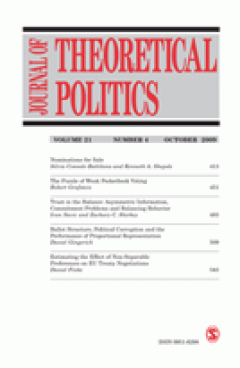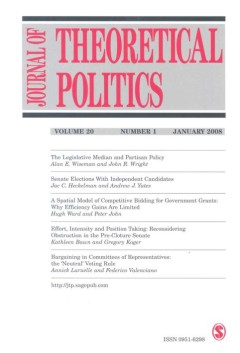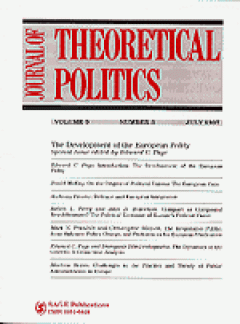Filter by

Multiple Principals and Oversight of Bureaucratic Policy-Making
I examine a model in which multiple legislative principals monitor a bureaucratic agent's implementation of a project. The principals can each perform oversight of the implementation to limit information asymmetries exploited by the agent. Oversight is costly to perform and due to information leakages between principals, oversight by one principal reveals information to all principals. Thus for…
- Edition
- Volume 21, Number 2, April 2009. pp. 161-186
- ISBN/ISSN
- 0951-6298
- Collation
- -
- Series Title
- Journal of Theoretical Politics
- Call Number
- -

Information Acquisition, Ideology and Turnout: Theory and Evidence From Britain
The amount of political information that voters decide to acquire during an electoral campaign depends, among other things, on prior ideological beliefs about parties and/or candidates. Voters that are ex ante indifferent about the candidates attach little value to information because they perceive that voting itself will have little value. Voters that are ex ante very ideological also attach l…
- Edition
- Volume 21, Number 2, April 2009. pp. 237-276
- ISBN/ISSN
- 0951-6298
- Collation
- -
- Series Title
- Journal of Theoretical Politics
- Call Number
- -

The Structure of Heresthetical Power
This article considers manipulation of collective choice � in such environments, a potential alternative is powerful only to the degree that its introduction can affect the collective decision. Using the Banks set (Banks, 1985), we present and characterize alternatives that can, and those that can not, affect sophisticated collective decision-making. Along with offering two substantive findings…
- Edition
- Volume 21, Number 2, April 2009. pp. 139-159
- ISBN/ISSN
- 0951-6298
- Collation
- -
- Series Title
- Journal of Theoretical Politics
- Call Number
- -

Creation of Social Order in Ethnic Conflict
This article develops a model of random matching with costly monitoring to demonstrate that the threat of ethnic conflict can function to create an in-group policing mechanism which helps enforce inter-ethnic social order. Instead of regarding ethnic conflict as a form of collective penalty on an unidentified wrongdoer and his ethnic brethren (Fearon and Laitin, 1996), we argue that ethnic conf…
- Edition
- Vol. 21, No. 3, July 2009.pp. 365-394
- ISBN/ISSN
- 09516298
- Collation
- -
- Series Title
- Journal of Theoretical Politics
- Call Number
- -

Matching Donors and Nonprofits: The Importance of Signaling in Funding Awards
The topic of nonprofit reform has sparked a debate on the battle between efficiency and effectiveness. Why do ineffective nonprofits survive? Prospective donors favor applicants likely to fulfill donor priorities. Donors with limited time and energy look for signals that reveal recipients' true capabilities. Knowing this, recipients attempt to send the right signals to prospective donors. If th…
- Edition
- Vol. 21, No. 3, July 2009.pp. 283-309
- ISBN/ISSN
- 0951-6298
- Collation
- -
- Series Title
- Journal of Theoretical Politics
- Call Number
- -

From Many, One: State Representation and the Construction of an American Iden…
I present a formal model of the effect of political representation on the formation of group identities using the drafting of the United States Constitution as a case study. I first show the presence of `factions', or groups with competing interests, to be beneficial in forging a national identity. Next, I use this model to argue that the Great Compromise succeeded as more than a political mane…
- Edition
- Vol. 21, No. 3, July 2009.pp. 343-364
- ISBN/ISSN
- 0951-6298
- Collation
- -
- Series Title
- Journal of Theoretical Politics
- Call Number
- -

Lotteries, Justice and Probability
Intuition suggests that a fair lottery is the appropriate way to allocate a scarce good when two or more people have equally strong claims to it. This article lays out three conditions that any conception of justice compatible with this intuition must satisfy � efficiency of outcomes, fairness of outcomes, and fairness of treatment. The third, unlike the first two, manifests itself only in the …
- Edition
- Vol. 21, No. 3, July 2009.pp. 395-409
- ISBN/ISSN
- 0951-6298
- Collation
- -
- Series Title
- Journal of Theoretical Politics
- Call Number
- -

Successful and Failed Screening Mechanisms in the Two Gulf Wars
The article addresses the question of how status-quo states can identify revisionist threats. After recasting the question within the collective security and social learning literatures, the article presents and models a new mechanism for the collective identification of threats � screening. It then identifies several conditions for the existence of screening mechanisms, among which states' mut…
- Edition
- Vol. 21, No. 3, July 2009.pp. 311-342
- ISBN/ISSN
- 0951-6298
- Collation
- -
- Series Title
- Journal of Theoretical Politics
- Call Number
- -

Ballot Structure, Political Corruption, and the Performance of Proportional R…
What is the relationship between ballot structure (the manner in which citizens cast their votes) and corruption related to the financing of politics? The author develops a principal agent�model which considers how differences in ballot structure may facilitate or impede attempts by parties to utilize the public administration as a source of electoral resources. Electoral systems which concentr…
- Edition
- Vol. 21, No. 4, October 2009.pp. 509-541
- ISBN/ISSN
- 0951-6298
- Collation
- -
- Series Title
- Journal of Theoretical Politics
- Call Number
- -

The Puzzle of Weak Pocketbook Voting
This article investigates why predominantly self-interested voters exhibit weak pocketbook voting. Focusing on the USA, it estimates partisan government�s impact on household income and, based on the Permanent Income Hypothesis, models the conversion of that income into consumption, the source of voters� utility in the model. The analysis implies that pocketbook voting is weak because anticipat…
- Edition
- Vol. 21, No. 4, October 2009.pp. 451-482
- ISBN/ISSN
- 0951-6298
- Collation
- -
- Series Title
- Journal of Theoretical Politics
- Call Number
- -

Estimating the Effect of Nonseparable Preferences in Eu Treaty Negotiations
This article derives theoretical expectations about the importance of nonseparable preferences at EU treaty negotiations. It argues that member states� positions on the degree of integration depend on the expected reform of the decision rule and vice versa. This nonseparability effect varies across member states. Wealthier member states (net payers) would prefer a more majoritarian and efficien…
- Edition
- Vol. 21, No. 4, October 2009.pp. 543-569
- ISBN/ISSN
- 0951-6298
- Collation
- -
- Series Title
- Journal of Theoretical Politics
- Call Number
- -

Nominations for Sale
Models of nomination politics in the USA often find �gridlock� in equilibrium because of the supermajority requirement in the Senate for the confirmation of presidential nominees. A blocking coalition often prefers to defeat any nominee. Yet empirically nominations are successful. In the present article we explore the possibility that senators can be induced to vote contrary to their nominal (g…
- Edition
- Vol. 21, No. 4, October 2009.pp. 413-449
- ISBN/ISSN
- 0951-6298
- Collation
- -
- Series Title
- Journal of Theoretical Politics
- Call Number
- -

Trust in the Balance: Asymmetric Information, Commitment Problems and Balanci…
Realists argue that balancing occurs in response to changes to the balance of power. Recent informational approaches have focused primarily on informational asymmetries or commitment problems. The article combines these two approaches and builds on them by incorporating characteristics of the revisionist state and the potential balancer, as well as the specific challenge to the balance of power…
- Edition
- Vol. 21, No. 4, October 2009.pp. 483-507
- ISBN/ISSN
- 09516298
- Collation
- -
- Series Title
- Journal of Theoretical Politics
- Call Number
- -

A Theoretical Analysis of Income Tax Evasion, Optimal Auditing, and Credibili…
We first construct a theoretical model of tax evasion in a stylized developing country in which all taxpayers have either high or low income. The key problem is that the high-income taxpayers may underreport their income. An individual income tax return can only be verified with an audit that costs c. There is a constant tax rate {tau} on income and a fine F on underpaid tax. In this setting, w…
- Edition
- Vol. 22, No. 1, January 2010. pp. 123-133
- ISBN/ISSN
- 09516298
- Collation
- -
- Series Title
- Journal of Theoretical Politics
- Call Number
- -

Condorcet Consistency of Approval Voting: a Counter Example in Large Poisson …
Approval Voting is analyzed in a context of large elections with strategic voters: the Myerson�s Large Poisson Games. We first establish the Magnitude Equivalence Theorem which substantially reduces the complexity of computing the magnitudes of the pivot outcomes. Furthermore, we show that the Condorcet Winner need not be the Winner of the election in equilibrium under Approval Voting. Indeed, …
- Edition
- Vol. 22, No. 1, January 2010. pp. 64-84
- ISBN/ISSN
- 09516298
- Collation
- -
- Series Title
- Journal of Theoretical Politics
- Call Number
- -

The Properties of Simple Vs. Absolute Majority Rule: Cases Where Absences and…
Little attention has been paid to the differences between absolute majority rule and simple majority rule, which differ in their treatment of absences and �votes to abstain�. This article fills that gap by undertaking a probabilistic analysis of the two voting rules assuming two alternatives and a quorum requirement for simple majority rule. The rules are compared in both a modified sincere set…
- Edition
- Vol. 22, No. 1, January 2010. pp. 85-122
- ISBN/ISSN
- 09516298
- Collation
- -
- Series Title
- Journal of Theoretical Politics
- Call Number
- -

Adaptively Rational Retrospective Voting
Since the seminal work of Key (1966), Kramer (1971), and Nordhaus (1975), retrospective voting has been a major component of voting theory. However, although these views are alive empirically (Lewis-Beck and Stegmaier, 2000; Franzese, 2002; Hibbs, 2006), most theorizing assumes rational citizens. We suspect that Key had a less heroic view of voter cognition, and we formalize his verbal theory a…
- Edition
- Vol. 22, No. 1, January 2010. pp. 26-63
- ISBN/ISSN
- 09516298
- Collation
- -
- Series Title
- Journal of Theoretical Politics
- Call Number
- -

The Effect of Initiatives on Local Government Spending
Tools of direct democracy, such as the citizen initiative, are available at both the state and local levels in the United States, yet models of the process typically do not consider these institutions in tandem. In this article, I develop a model of local fiscal policy that incorporates the impact of a statewide as well as a local initiative process. I posit that the statewide initiative proces…
- Edition
- Vol. 22, No. 1, January 2010. pp. 6-25
- ISBN/ISSN
- 09516298
- Collation
- -
- Series Title
- Journal of Theoretical Politics
- Call Number
- -

Ambiguous Statutes and Judicial Deference To Federal Agencies
The Supreme Court�s Chevron decision raises questions about why Congress passes ambiguous statutes and why courts defer to agencies rather than impose their own interpretations. This article presents a model of policymaking where the legislature chooses strategically between an ambiguous and explicit statute, and where rulemaking and judicial review follow. The analysis reveals that when statut…
- Edition
- Vol. 22, No. 2, April 2010. pp 217-245
- ISBN/ISSN
- 09516298
- Collation
- -
- Series Title
- Journal of Theoretical Politics
- Call Number
- -

The Implications of High Court Docket Control for Resource Allocation and Leg…
A key source of institutional variation across judicial systems is the degree of control that the highest court has over its docket. Despite this variation, the consequences of various institutional designs in judicial hierarchies remain relatively unexplored by the theoretical literature. In this article, we develop a formal model of high court resource allocation. We analyze the model under t…
- Edition
- Vol. 22, No. 2, April 2010. pp. 247-268
- ISBN/ISSN
- 09516298
- Collation
- -
- Series Title
- Journal of Theoretical Politics
- Call Number
- -
 Computer Science, Information & General Works
Computer Science, Information & General Works  Philosophy & Psychology
Philosophy & Psychology  Religion
Religion  Social Sciences
Social Sciences  Language
Language  Pure Science
Pure Science  Applied Sciences
Applied Sciences  Art & Recreation
Art & Recreation  Literature
Literature  History & Geography
History & Geography